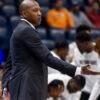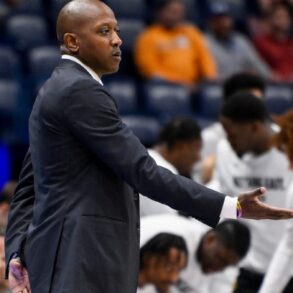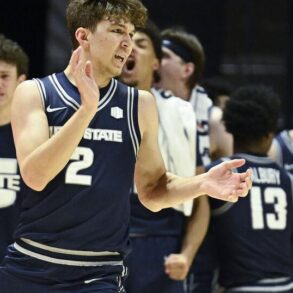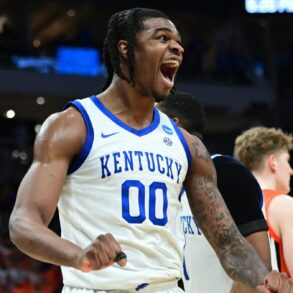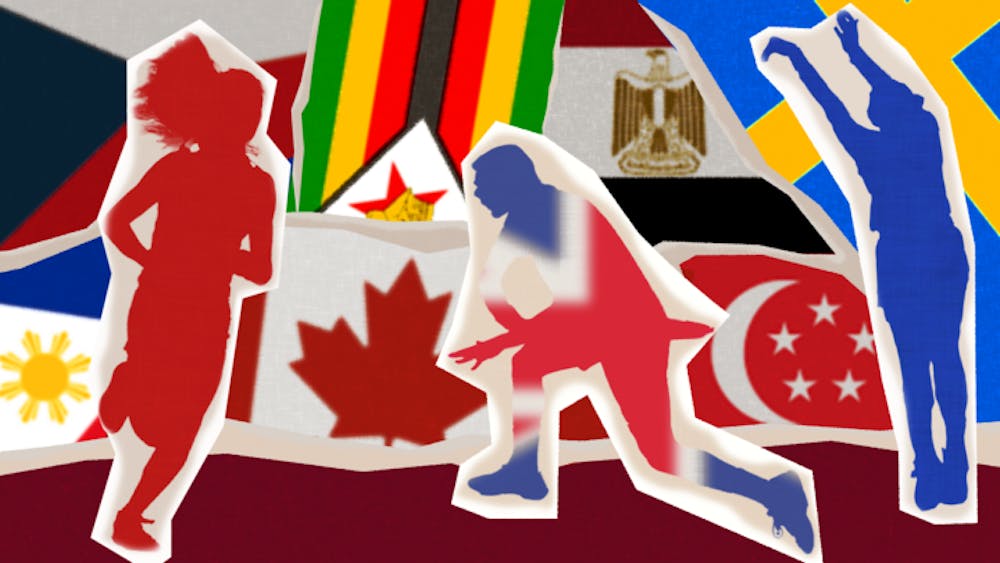
Credit: Kara Butler
Throughout its nearly 100-year-old history, the Palestra — also known as the Cathedral of College Basketball — has hosted many things: the most number of NCAA basketball tournaments, NBA teams, high school basketball championship games, wrestling competitions, and volleyball matches, just to name a few.
But perhaps the most endearing moments come during the lulls in action. On March 27, a handful of athletes playing “H-O-R-S-E” and knockout in the evening help embody what the Palestra means for Penn’s athletes who call it home. Of the 10 athletes there, only three were basketball players, with the other seven hailing from a variety of athletic backgrounds ranging from track and field to squash. But that didn’t matter, as smiles were traded easily around the arena and music blasted, setting the vibe as one of positivity.
Noticeably missing from the scene was the sense of intense competition that typically accompanies any event hosted at the Palestra. The athletes moved loose, with no urgency, no burning desire to out-play, out-hustle, or out-cheer the other team. After all, the event was the International Student-Athlete Association’s open basketball night, and the focus was more so on finding community than anything else.
The ISAA brings together athletes from all over the world and gives them a chance to bond as students who share similar struggles of living in a foreign country. ISAA’s three co-presidents shared similar sentiments on its role in the Penn athletics community. ISAA Co-President and men’s squash senior Oliver Green called it a “support network,” while ISAA Co-President and women’s basketball senior guard Stina Almqvist called it a “better Penn community” and ISAA Co-President and sophomore distance runner Gabrielle Jones deemed it a “welcoming space.”
That Thursday evening, all three looked to be true as basketball, squash, and track and field athletes lined up behind the charity stripe to take turns shooting the basketball. In a particularly sweet moment, as Almqvist taught a men’s squash player her signature move, the rest of the group crowded around to cheer him on.
Quite simply, it looks like a family.
The ISAA brings “athletes together from different teams that would have otherwise probably not crossed paths,” Jones said.
Coming to the United States is challenging, and there are things that international students have to get used to that American students may not realize — things such as getting a new phone number, opening a bank account, and getting a Social Security number.
“It’s the little things that can add up into the big things,” Jones said.
All of that was challenging for the three co-presidents. But they are determined to make it easier for the incoming freshmen.
“I want them to feel at home right from the very beginning,” Jones said.
To accomplish that goal, they put together a document with a lot of practical information that Penn coaches have access to. The ISAA had its first “Friendsgiving” event in November 2024 so that international students, who don’t have enough time to go back home and also never really celebrated the American holiday of Thanksgiving growing up, could spend the break with one another.
“It was a really good time to have people around in times where internationals will be feeling a little bit lonely during that time because everyone’s off campus during that week,” Green said. “It’s so nice that this club has made people realize that you aren’t alone.”
The athletes had a meal together and put on some Penn games so that they could watch and support their “other family members,” according to Jones, who could not make the event because of matches. ISAA members often watch and support each other’s games, so not only are athletes exposed to other athletes, but they are also exposed to other sports as well.
“Games are so much more fun when you have people that come support you,” Almqvist said.
There are currently around 70 members in the ISAA from a variety of countries, including Latvia, Sweden, Zimbabwe, and South Africa. Under Almqvist, Green, and Jones’ leadership, the club has started to become more active through events like Friendsgiving, open basketball night, and picnics. But they hope to become more organized and effective. Next year, they hope to form a board. And even though Almqvist and Green are graduating this year, they hope to stay connected through an alumni network they hope the ISAA will start.
“It’s really what you make of it,” Almqvist said.
No one is forced to join or forced to come to events, but they want all international student-athletes to know that ISAA is there for them. Especially during a time when immigration policies are changing under the new Trump administration, ISAA has focused on supporting anyone who has concerns or questions.
“When people are far away from home … we can just build a little community here.”
The Daily Pennsylvanian is an independent, student-run newspaper. Please consider making a donation to support the coverage that shapes the University. Your generosity ensures a future of strong journalism at Penn.
More Like This
This post was originally published on this site be sure to check out more of their content.


